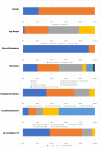Does antibiotic awareness campaigns exposure decrease intention to demand antibiotic treatment? Testing a structural model among parents in Western Australia
- PMID: 37200317
- PMCID: PMC10194918
- DOI: 10.1371/journal.pone.0285396
Does antibiotic awareness campaigns exposure decrease intention to demand antibiotic treatment? Testing a structural model among parents in Western Australia
Abstract
Antimicrobial resistance (AMR) is one of the key public health concerns the world is facing today. The effect of antibiotic awareness campaigns (AACs) on consumer behaviour has been documented in the literature with mixed results. Understanding the mechanism for how AACs affect target populations is vital in designing effective and tailored campaigns. Using structural equation modelling our study examined the relationships among people's exposure to antibiotic awareness campaigns, knowledge of AMR prevention, AMR risk perception, and intention to seek antibiotic treatment. This study also tested the moderating effect of anxiety and societal responsibility on preventing AMR, and on their intention to demand antibiotic treatment mediated by knowledge of AMR prevention and risk-perception. Primary data was generated using an online survey of 250 Western Australian parents. We tested our hypotheses using reliability and validity tests and structural equation modelling. Our results show that exposure to AACs alone may not be enough to change parental intention to demand antibiotic prescription for their children. Parental risk perception of AMR and parental anxiety affect intention to demand antibiotics, and the view that AMR is a social responsibility has a moderating effect on intention to demand antibiotics. These factors could be considered and combine messaging strategies in designing future antibiotic awareness campaigns.
Copyright: © 2023 Alejandro et al. This is an open access article distributed under the terms of the Creative Commons Attribution License, which permits unrestricted use, distribution, and reproduction in any medium, provided the original author and source are credited.
Conflict of interest statement
The authors have declared that no competing interests exist.
Figures
References
-
- World Health Organization. Global action plan on antimicrobial resistance. Geneva: World Health Organization; 2015. [cited 2022 Dec 1] Available from: https://www.who.int/publications/i/item/9789241509763 - PubMed
-
- O’Neill J. Tackling drug-resistant infections globally: final report and recommendations United Kingdom. Government of the United Kingdom; 2016. [cited 2022 Dec 1] Available from: https://amr-review.org/sites/default/files/160518_Final%20paper_with%20c...
-
- World Health Organization (WHO), Food and Agriculture Organization of the United Nations (FAO), World Organisation for Animal Health. Monitoring global progess on addressing antimicorbial resistance: analysis report of the second round of resultsof AMR country self-assessment survey; 2018. [cited 2022 Dec 1] Available from: https://apps.who.int/iris/bitstream/handle/10665/273128/9789241514422-en....
-
- World Health Organisation. Library of AMR national action plans 2022; [cited 2022 Dec 1] Available from: https://www.who.int/teams/surveillance-prevention-control-AMR/national-a....
Publication types
MeSH terms
Substances
LinkOut - more resources
Full Text Sources
Medical



